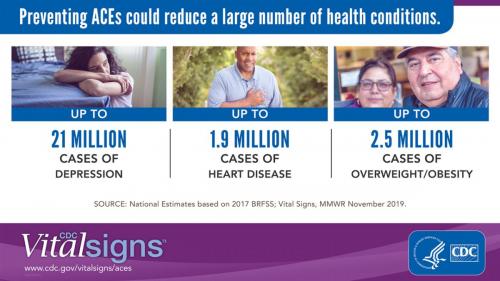Preventing Adverse Childhood Experiences (ACEs) to improve U.S. health
ACEs linked to at least 5 of the top 10 leading causes of death
A first-ever CDC analysis provides comprehensive estimates of the potential to improve Americans’ health by preventing Adverse Childhood Experiences (ACEs).

ACEs can include experiencing abuse, witnessing violence or substance misuse in the home, and having a parent in jail. Exposure to ACEs can result in extreme or repetitive toxic stress responses that can cause both immediate and long-term physical and emotional harms.
At least five of the top 10 leading causes of death are associated with ACEs. Preventing ACEs could potentially reduce chronic diseases, risky health behaviors, and socioeconomic challenges later in life.
These findings appear in CDC’s latest Vital Signs report, which examines the associations between ACEs and 14 negative outcomes. CDC analyzed data from 25 states that included ACE questions in the Behavior Risk Factor Surveillance System (BRFSS) from 2015 through 2017. State survey data were used to estimate long-term health and social outcomes in adults that contribute to leading causes of illness and death and reduced access to life opportunities.
ACEs are common and their impacts add up over time
CDC scientists analyzed data from more than 144,000 adults and found:
•ACEs are linked to chronic health problems, mental health, substance misuse, and reduced educational and occupational achievement.
•Preventing ACEs has the potential to reduce leading causes of death such as heart disease, cancer, respiratory disease, diabetes, and suicide.
•ACEs prevention can have a positive impact on education and employment levels.
Key findings
•Adults reporting the highest level of ACEs exposure had increased odds of having chronic health conditions, depression, current smoking, heavy drinking, and socioeconomic challenges like current unemployment, compared to those reporting no ACEs.
•Women, American Indian/Alaskan Natives, and African Americans/Blacks were more likely to experience four or more ACEs.
•Preventing ACEs could have reduced the number of adults who had heart disease by as much as 13% – up to 1.9 million avoided cases, using 2017 national estimates.
•Preventing ACEs could have reduced the number of adults who were overweight/obese by as much as 2% – up to 2.5 million avoided cases of overweight/obesity, using 2017 national estimates.
•Preventing ACEs could have reduced the number of adults with depression by as much as 44% – up to 21 million avoided cases of depression, using 2017 national estimates.
CDC works to prevent ACEs and lessen their negative effects. These efforts include:
•Educating states and communities about effective social and economic supports that address financial hardship and other conditions that put families at risk for ACEs.
•Encouraging employers to adopt and support family-friendly policies such as paid family leave and flexible work schedules.
•Increasing access to programs that enhance parents’ and youths’ skills to handle stress, resolve conflicts, and reduce violence.
•Improving school environments to lessen the impact of ACEs and prevent further trauma.
•Educating healthcare providers to recognize current risk in children and ACEs history in adults, and to refer patients to effective family services and support.
CDC encourages communities to take advantage of the best available evidence and join CDC in efforts to prevent ACEs. Everyone can help: Parents, teachers and school counselors, religious leaders, business leaders, health care professionals, and charitable organizations.
Source: U.S. Centers for Disease Control and Prevention
- 279 reads
Human Rights
Fostering a More Humane World: The 28th Eurasian Economic Summi

Conscience, Hope, and Action: Keys to Global Peace and Sustainability

Ringing FOWPAL’s Peace Bell for the World:Nobel Peace Prize Laureates’ Visions and Actions

Protecting the World’s Cultural Diversity for a Sustainable Future

Puppet Show I International Friendship Day 2020

